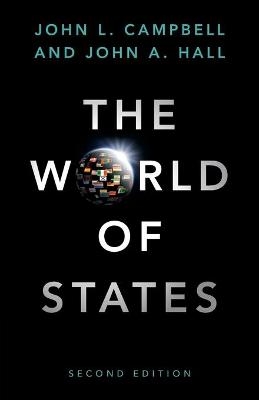
The World of States
Seiten
2021
|
2nd Revised edition
Cambridge University Press (Verlag)
978-1-108-96589-7 (ISBN)
Cambridge University Press (Verlag)
978-1-108-96589-7 (ISBN)
A sweeping account of how modern states evolved, this book examines what makes states effective, how contemporary states differ, and the interactions between them. Challenging the view that nation-states have lost their relevance in the content of globalization, Hall and Campbell argue that states are still necessary for human process.
Without nation-states Covid-19, climate change, international cyberattacks, and other threats would go unchecked. In The World of States, John L. Campbell and John A. Hall challenge the view that nation-states have lost their relevance in the context of globalization and rising nationalism. The book traces how states evolved historically, how contemporary states differ from one another, and the interactions between them. States today confront a host of challenges, but two features make some states more effective than others: institutional arrangement and national identity. The second edition has been updated to discuss why the BRICS countries (with the exception of China) are no longer the rising powers they were once thought to be; the effects of Brexit on the European Union; the legacy of the Trump administration for US politics and hegemony; and how the coronavirus may upset the world of states going forward.
Without nation-states Covid-19, climate change, international cyberattacks, and other threats would go unchecked. In The World of States, John L. Campbell and John A. Hall challenge the view that nation-states have lost their relevance in the context of globalization and rising nationalism. The book traces how states evolved historically, how contemporary states differ from one another, and the interactions between them. States today confront a host of challenges, but two features make some states more effective than others: institutional arrangement and national identity. The second edition has been updated to discuss why the BRICS countries (with the exception of China) are no longer the rising powers they were once thought to be; the effects of Brexit on the European Union; the legacy of the Trump administration for US politics and hegemony; and how the coronavirus may upset the world of states going forward.
John L. Campbell is the Class of 1925 Professor and Professor of Sociology at Dartmouth College. He is the author of American Discontent and other books. He lives in Lyme, New Hampshire. John A. Hall is the James McGill Professor of Comparative Historical Sociology at McGill University. He is the author of The Importance of Being Civil and other books. He lives in Burlington, Vermont and Montreal, Quebec.
Introduction; 1. The past; 2. Conditions of existence, old and new; 3. Challengers?; 4. States of the Global South; 5. The North; 6. Still the strongest power on Earth?; Conclusion.
| Erscheinungsdatum | 04.06.2021 |
|---|---|
| Zusatzinfo | Worked examples or Exercises |
| Verlagsort | Cambridge |
| Sprache | englisch |
| Maße | 138 x 216 mm |
| Gewicht | 370 g |
| Themenwelt | Sozialwissenschaften ► Politik / Verwaltung ► Europäische / Internationale Politik |
| Sozialwissenschaften ► Politik / Verwaltung ► Vergleichende Politikwissenschaften | |
| Sozialwissenschaften ► Soziologie | |
| ISBN-10 | 1-108-96589-X / 110896589X |
| ISBN-13 | 978-1-108-96589-7 / 9781108965897 |
| Zustand | Neuware |
| Haben Sie eine Frage zum Produkt? |
Mehr entdecken
aus dem Bereich
aus dem Bereich
Studienbuch
Buch | Hardcover (2023)
De Gruyter Oldenbourg (Verlag)
44,95 €
erfolgreiche Interessenvertretung durch Prozesskompetenz im komplexen …
Buch | Hardcover (2023)
Wiley-VCH (Verlag)
42,00 €


